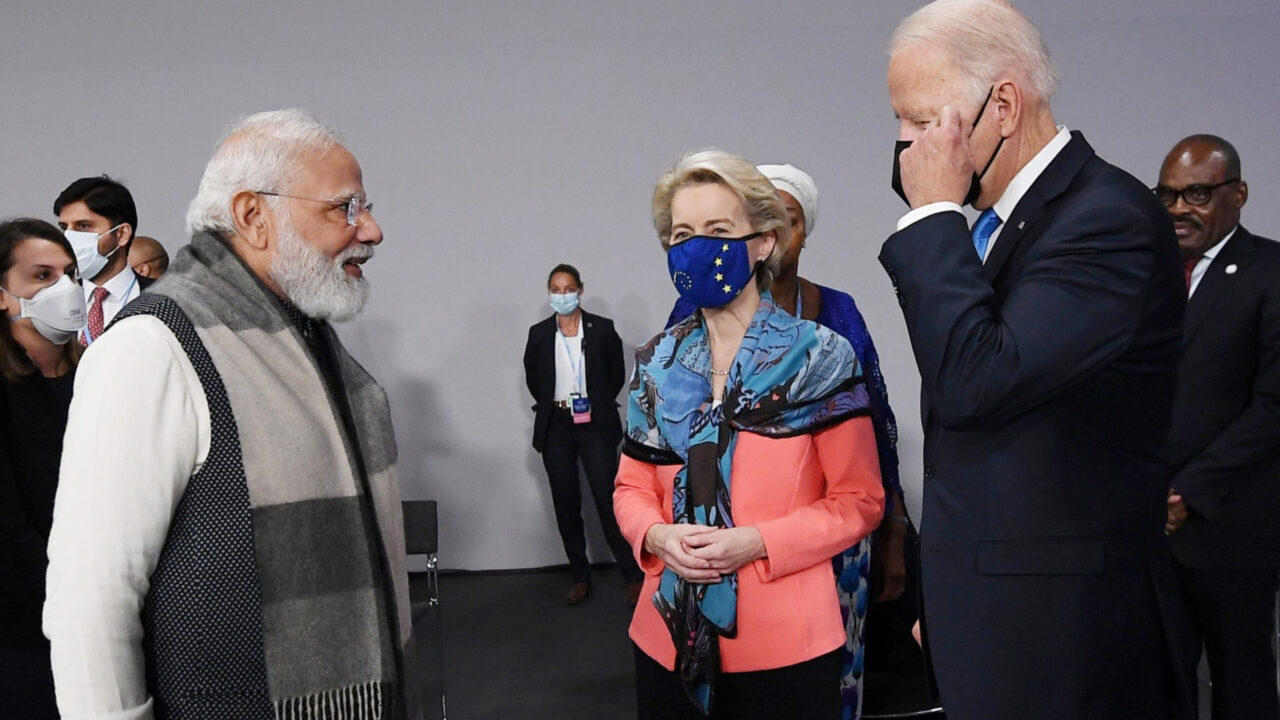Why India’s silence on Ukraine is an opportunity for Europe
India’s dependency on Russia has left it reluctant to publicly criticise Putin’s war on Ukraine. Rather than pressure India to pick a side, the EU should show India that it is a serious geopolitical partner
India’s reluctance to publicly criticise Russian President Vladimir Putin’s all-out war on Ukraine has surprised many observers. Alongside 34 other countries, including China and the United Arab Emirates, India abstained from the vote on the recent United Nations Security Council resolution condemning the Russian invasion. In stressing the importance of “the UN Charter, international law, and respect for the sovereignty and territorial integrity of states”, India’s UN representative, TS Tirumurti, signalled indirect disapproval of Moscow’s actions – but this was not enough to satisfy the West’s need for a clear position from India.
The West and Asian countries such as Japan and South Korea have come out in clear opposition to the war, stating that they are willing to pay the economic price for this. There seems to be no room for important geopolitical players to remain silent. The world’s largest democracy is a key pillar of the United States’ Indo-Pacific policy and features heavily in the European Union’s plans for increased engagement in the region. So, the EU and its allies are placing India under considerable pressure to speak up.
But instead of questioning India’s position as a like-minded partner – and with it the stronger EU-India relations of the last two years – the union should do more to demonstrate its commitment to deeper cooperation with the country. Indeed, it is in the EU’s interest to show India that it is a reliable partner.
On the surface, India’s reticence on Ukraine seems to be in step with its long-standing policy of non-alignment. But it may, in fact, be more a reflection of its overdependence on Russia and the geopolitical realities India faces. India is in a tense security environment. And Russia has been an important partner for India in its border conflicts with both Pakistan and China. Russia also provides political and diplomatic support to India in international institutions such as the UN. For example, Moscow has repeatedly vetoed UN resolutions condemning New Delhi over its actions in Indian-administered Kashmir.
Russia is also an important economic partner: India imported goods worth $6.9 billion from Russia in 2021 – mainly mineral oils, fertiliser, precious stones, and nuclear technology. Its exports to Russia stood at $3.33 billion, ranging from pharmaceutical products to tea and coffee. Although India has begun to diversify its weapons portfolio and build up its own arms industry, Russia is the source of around 50 per cent of the weapons used by the Indian armed forces. And, in December 2021, despite looming US sanctions on Russia, New Delhi reaffirmed its strategic relationship with Moscow through a $5.2 billion deal for Russian S-400 surface-to-air missile systems.
India’s silence on Ukraine should not be mistaken for sympathy with Russia
Nonetheless, India has strengthened its security cooperation with the US through bilateral agreements such as the Communications Compatibility and Security Agreement in 2018 and the Second US-India Defense Framework Agreement in 2015. The latter agreement sets out plans for the intensification of security cooperation between the two countries until 2025, including through military exercises – particularly those in the maritime domain, such as the annual Malabar exercise. New Delhi has further deepened its multilateral engagement with the West through formats such as the Quadrilateral Security Dialogue, which comprises the US, India, Japan, and Australia.
India’s silence on Ukraine should not be mistaken for sympathy with Russia. For years, India’s foreign policy has focused on walking the fine line between Moscow and Washington while simultaneously navigating its relationship with Beijing. In this context, it seems to be an uncomfortable necessity for New Delhi to maintain a diplomatic balance on Ukraine.
Therefore, instead of intensifying pressure on India to openly choose a side, the European Union should think about what it can offer the country to help address its dilemma. India’s efforts to reduce its dependency on Russia are part of a complex, long-term process. And one necessary but insufficient condition for greater autonomy from Russia will be a stronger Indian economy. Of course, the EU cannot meet all of India’s political and economic needs – but it can play an active role in the gradual diversification process.
India has generally perceived the EU to be more of a trading partner than a geopolitical actor. However, the union’s position has changed radically in the last two weeks. For a long time, wars of aggression have been geographically distant for the EU. But, as members of the EU see their own security threatened by a foreign invasion for the first time in recent history, they may now be able to relate to partners such as India – whose security interests are constantly threatened by its neighbours. In this context, Putin’s war on Ukraine and Beijing’s support for him should push the EU to re-evaluate its relations with not only Russia but also China.
As a geopolitical EU that protects its own security interests should now understand, an important part of a holistic approach to the Indo-Pacific is an active contribution to the region’s security architecture. EU member states have limited military capabilities and are facing a dilemma in military-resources allocation of their own. But the EU does have something to offer: in the last 20 years, its 27 current member states have been responsible for 24 per cent of total global arms exports. In fact, eight out of the 25 largest arms exporters are EU member states, including France (third) and Germany (fourth). Both countries already export weapons to India – albeit in smaller quantities than the US and Russia do.
Therefore, the EU should adopt a strategic approach to its trade policies. This is especially relevant for arms exports, which the union can use to strengthen partners such as India – thereby helping the country reduce its dependency on Russia while maintaining a balance in its relations with China and the US. Support for India’s diversification efforts is also in the EU’s interest because of the limitations on European military resources allocated to the Indo-Pacific.
As the war in Ukraine has shown Europe, a foreign policy based on economics alone is insufficient in a world increasingly shaped by security interests.
The European Council on Foreign Relations does not take collective positions. ECFR publications only represent the views of their individual authors.



